|
|
|
Sort Order |
|
|
|
Items / Page
|
|
|
|
|
|
|
| Srl | Item |
| 1 |
ID:
104381
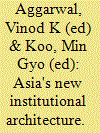

|
|
|
|
|
| Publication |
Berlin, Springer, 2008.
|
| Description |
vii, 321p.
|
| Series |
Political economy of the Asia Pacific
|
| Standard Number |
9783540748878
|
|
|
|
|
|
|
|
|
|
|
|
Copies: C:1/I:0,R:0,Q:0
Circulation
| Accession# | Call# | Current Location | Status | Policy | Location |
| 055976 | 352.01095/AGG 055976 | Main | On Shelf | General | |
|
|
|
|
| 2 |
ID:
152205
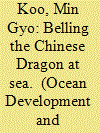

|
|
|
|
|
| Summary/Abstract |
Against the backdrop of projections of either conflict escalation or legal settlement by Western international relations theories, this article provides a more nuanced and subtle balance between Western theories and Asian realities.
|
|
|
|
|
|
|
|
|
|
|
|
|
|
|
|
| 3 |
ID:
064685
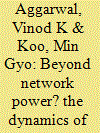

|
|
|
| 4 |
ID:
069241


|
|
|
| 5 |
ID:
078846
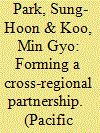

|
|
|
|
|
| Publication |
2007.
|
| Summary/Abstract |
CRTAs have become a main feature of South Korea's newly found enthusiasm for a multi-track FTA strategy. In this study, we examine the rise of South Korea's aggressive FTA initiatives, with a special focus on the first cross-Pacific FTA, namely the South Korea-Chile FTA, and draw implications for South Korea's other RTA initiatives. South Korea's motivations to pursue CRTAs are complex. These include economic, political and diplomatic/leverage motives. South Korea's policy departure from its long-standing support for the multilateral trading system began with its FTA negotiations with Chile, a country located on the opposite side of the globe. Aside from the South Korea-Chile FTA, South Korea has been negotiating a number of other CRTAs. Most importantly, South Korea and the US began to negotiate a bilateral FTA in June 2006, the successful conclusion of which will have significant economic and strategic repercussions not only for South Korea but also for its neighbouring East Asian countries. The economic and strategic motivations of the political leadership, as well as the new bureaucratic balance of power centred on the Office of the Minister for Trade, have played a significant role in South Korea's dramatic rush toward RTAs. Although South Korea's pursuit of RTAs does not necessarily mean that it has completely abandoned the multilateral trading system, the policy departure is increasingly becoming obvious and significant.
|
|
|
|
|
|
|
|
|
|
|
|
|
|
|
|
| 6 |
ID:
118948


|
|
|
|
|
| Publication |
2013.
|
| Summary/Abstract |
We develop an expanded two-level game analysis of trade negotiations between South Korea and the United States, with an emphasis on the important cases of beef and automobiles. The theoretical background of this study is that the chief negotiator is not always an honest agent with no independent motive. We find that small perceived win-sets during the beef and automobile negotiations in the 1990s created problems at the negotiation stage (as already predicted by Putnam), while large perceived win-sets during the Korea-US free trade agreement (KORUS FTA) negotiations produced unexpected, but eventually resolved, problems at the ratification stage. Our analysis shows when and why larger perceived win-sets emerge in spite of the greater risk of failed ratification. During their bilateral negotiations in the 1990s, trade negotiators' autonomy, both in South Korea and in the United States, was institutionally weak, and their policy ideas were subordinated to mercantilism or fair-trade ideas, thus creating small perceived win-sets. By contrast, the empowerment of the Office of the Minister for Trade in South Korea after 2004 and the provision of trade promotion authority in 2002 to the US Trade Representative institutionally strengthened chief negotiators' autonomy vis-à-vis KORUS FTA negotiations, thus producing large perceived win-sets. During this period, the chief negotiators' autonomy, combined with their free-trade ideas, as well as with their own institutional interests, made the domestic constituency's win-set as perceived by chief negotiators larger than a Putnam's two-level game analysis would have predicted. The ratification of the KORUS FTA, albeit prolonged much longer than anyone expected, illustrates that the chief negotiators did not 'incorrectly' perceive their win-sets to be larger than they actually were.
|
|
|
|
|
|
|
|
|
|
|
|
|
|
|
|
| 7 |
ID:
106464
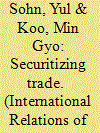

|
|
|
|
|
| Publication |
2011.
|
| Summary/Abstract |
The Korea-US free trade agreement (KORUS FTA) of 2007 clearly shows how countries simultaneously pursue economic benefits and strategic interests in trade negotiations. This study argues that the surprise launch and the successful conclusion of the KORUS FTA illustrate the joint efforts by the United States and the Republic of Korea to re-securitize their bilateral economic relations. Security and strategic calculations held by top policy-makers on both sides catalyzed the official launch of FTA negotiations by removing a number of longstanding trade irritants such as Korea's screen quotas and ban on US beefs. At the post-negotiation stage, however, the lack of bipartisanship-particularly in the United States-to provide trade liberalization for their allies in favor of their own broader strategic interests has led to the legislative stalemate of executive efforts at re-securitization of trade relations. This study concludes that the stalemated ratification process shows the erosion, not the strength, of US power to provide security and trade liberalization as public goods.
|
|
|
|
|
|
|
|
|
|
|
|
|
|
|
|
| 8 |
ID:
088451


|
|
|
|
|
| Publication |
2009.
|
| Summary/Abstract |
Can economic interdependence reduce conflicts among states in East Asia? The so-called 'cold politics and hot economics' has become a defining feature of Sino-Japanese political-economic relations. This puzzling pattern of interaction is clearly illustrated in the sovereignty dispute over the Senkaku/Diaoyu Islands. The island dispute has unfolded in five rounds of distinct clashes thus far. From one perspective, the competitive elements in the island dispute make it difficult for both Japan and China to give way to the other side on the territorial and maritime issues. At the same time, the two countries have successfully managed to contain their respective territorial and maritime claims thus far. Drawing on the liberal peace theory, this article systematically demonstrates that economic interdependence has repeatedly fostered the de-escalation of Sino-Japanese conflict over territorial and maritime rights
|
|
|
|
|
|
|
|
|
|
|
|
|
|
|
|
|
|
|
|
|